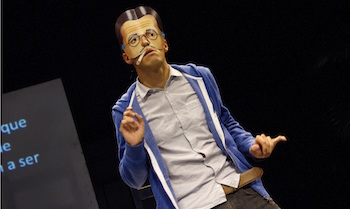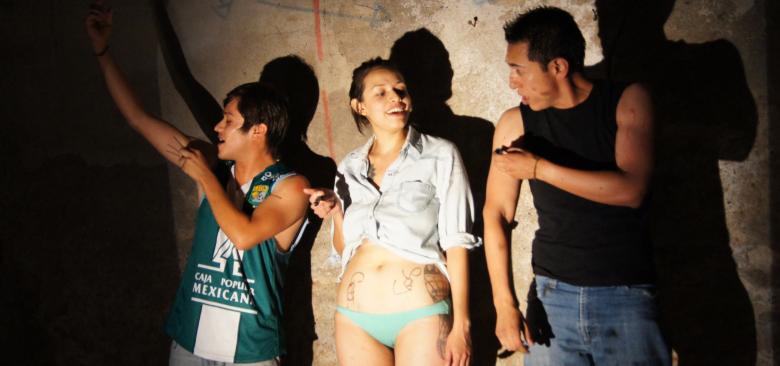It’s a big day for the Latin American Theatre Festival, CASA. Now in its eighth anniversary, this year’s festival pays tribute to Mexico to coincide with the celebration of its second year in partnership with the UK.
It’s a big day for the Latin America Theatre Festival, CASA. Now in its eighth anniversary, this year’s festival pays tribute to Mexico to coincide with the celebration of its second year in partnership with the UK. Under the title ‘Discussion Day: Mexican Theatre and Politics’, the event offers a day of free activities, including a documentary screening, poetry recitals and two table discussions in order to analyse the response of theatre-goers, artists, producers and all representatives of Mexican culture alike towards the current cases of human right abuses and corruption in Mexico.
Far from the friendly face of other promotional events, the festival director Daniel Goldman – a British migrant who’s been living in Argentina for the last 10 years – claims that this year’s festival is about offering a profound insight into the life and struggles of Mexico today. In addition to the debates, the organisation has selected 5 pieces of theatre from over 100 entries which will be represented by 4 different theatre companies. In keeping with the essence of the festival (which is renowned for its support of up-and-coming theatre), these pieces all have a clear political slant.
The debate kicked off with the screening of ‘Rosario’, a moving documentary about the story of a mother who dedicates her life to a fight for justice and truth in the wake of her son’s disappearance in Monterrey, Northern Mexico.
The debating sessions, which were organised with the help of PhD students from King’s College London, offered two distinct panels which each gave their views on the unstable situation in Mexico and the way it’s reflected in the arts.
This was followed by a reading of ‘43 poems by Ayotzinapa’, which is an emotional tribute to the missing students who were arrested just over a year ago and are still yet to be found. This project was initiated by a collaboration of poets, playwrights and novelists as a remembrance of the students and their families.
The debating sessions, which were organised with the help of PhD students from King’s College London, offered two distinct panels which each gave their views on the unstable situation in Mexico and the way it’s reflected in the arts. The presence of members from various collectives, as well as artists, activists, journalists, actors and playwrights really stressed the essential role of the artist in expressing the world around them (which is often much harder and more violent than a work of fiction could ever be), through the means of a personal and political commitment to a struggle which those of us living in societies as relatively comfortable as the UK might find difficult to understand.
From the archives to the stage
Once inside, festival attendees were treated to a debut performance of ‘Aparte’ by the Colectivo Alebrije as well as ‘Montserrat’ by the Lagartijas Tiradas al Sol theatre company. Both pieces fall within the genre known as Documentary Theatre.
The genre undoubtedly owes itself to writers such as Piscator, Brecht, Artaud and Weiss who, at the start of the 20th century experimented with theories and dramatic techniques in order to achieve this socially-engaging theatre which they applied to facts about their own country’s background and history. Documentary Theatre, which then later re-emerged in 1990s Germany, is characterised by the way in which it plays with the fragile boundary between fiction and reality, seeks to raise awareness through in-depth analysis and establish a political stance towards a given social situation. Recently, its influence has extended into the development of contemporary theatre, given that the current tumultuous period in Latin American history, with the fights against dictatorships and social repression proving to be a fertile subject for theatre. It is because of this, that political and documentary theatre has found a place in the Latin American arts. In the case of Mexico, it is Vincente Leñero who has taken up this genre and reworked it in a way that has earned him his reputation as one of Mexico’s leading playwrights; he is seen not only as a key player in Latin American documentary theatre, but also as the founder of the New Mexican Dramaturgy movement.
The staging in ‘Aparte’ is visually stunning as it projects images of both old and modern times, alternating between acetate-screen visuals, photographs, newspaper clippings and even radiographs and high-definition video footage.
His play, ‘Aparte’ seeks to recreate the economic decadence of Barrio Arriba (a district in the city of León, Guanajato) which is forced to replace its traditional artisan tannery industry with a modernised mass-production outfit to cater for growing global demands. Far from being a local drama, the central theme of the play connects with the wider concern that communities all over the world are being crushed by governments which are insensitive and ruthless in their approach to modernizing traditional industries. The staging in ‘Aparte’ is visually stunning as it projects images of both old and modern times, alternating between acetate-screen visuals, photographs, newspaper clippings and even radiographs and high-definition video footage. The piece is delivered in the form of an expository conference in which Sara Pinedo, author of a document which details the history and decadence of the district as according to her grandmother (an inhabitant of Barrio Arriba), gives her personal verdict on the events that ensued. Óscar Rodriguez, does the same with his mother (whose part we see being played in an intense scene), a former worker at one of the tannery factories who is now riddled with cancer. This testimony is a clear reference to all the unnamed victims who later suffered from the chemicals used in the tanneries. The piece also incorporates elements of physical theatre as the actors perform choreographed sequences in which they use their bodies to express different moods. This is done to masterful effect in an impressive dance where they strike dripping-wet pieces of leather against the floor. Khalé Chriagop really shines in one of the most emotional passages ever. CASA 2015 © Lagartijas Tiradas al Sol / Montserrat
Gabino Rodríguez, co-director of the ‘Lagartijas Tiradas al Sol’ theatre company, is the writer and star of ‘Montserrat’, the company’s first piece. The play follows the personal story of Gabino, an alleged orphan from the age of six who goes in search of his mother after discovering that her death certificate was fake. The piece is about the recovery of family memories and explores the way in which human beings construct their identity from both their memory and stories from their past. In a brilliant monologue full of nuances, the actor narrates his detective-like journey by using encounters, clues and documents to convey his quest whereby truth and fiction cross over and merge in both his internal life and his external surroundings. Like in ‘Aparte’, the projection of images plays a key role in the development of the narrative. The twist at the end responds to one of the company’s most reoccurring ideas: how the formation of memories can challenge our past and history itself. Indeed, ‘Monserrat’ is essentially inviting us to change our interpretations of the past to invent a new future.
————————-
Cover photo courtesy by CASA © Colectivo Alebrije / Aparte

